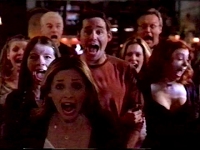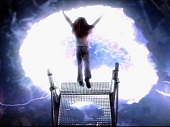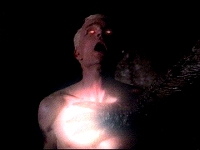|
+EXISTENTIAL MUCH+
Season
6 references for the whole season - you have been warned!
Buffy
Season Six has been the season when the group dynamic finally
broke down. In Season Four it became fractured, as Buffy moved
away from her friends and towards the Initiative and Riley,
Willow for the first time had a significant relationship outside
of the Scooby Gang, and Xander felt like his status as non-super
guy was becoming beyond a joke. But while in Season Four the
breakages it were quickly healed, by Season Six it was completely
different. Buffy began to feel no one understood her, Xander
was unable to commit to Anya or tell her how he felt, Willow
had been drawn into dark magic and couldn't even confide in
Tara, and Giles was up and leaving. The Season was about individuals,
about the difficulties of adulthood and responsibility, and
about the pressures of living in the world with others. Existential
much?
 Existentialism
is virtually impossible to define completely, partly because
it's so deliberately vague and complex (possibly so academics
have something to talk about). However it's possible to broadly
sum it up as a way of viewing the word in which the focus is
always on the individual, on a personal morality, and on a desire
to search for an authentic self not bound by the constraints
of society. For existentialists, there is no great meaning in
world which can be defined by religion or philosophy, or if
there is, then it's impossible to grasp. Existence comes before
essence; that is, we exist before we have anything determined
in us, in the way of values or morals. Therefore because we
aren't born with an essence or a moral complex, it's up to us
to make up own minds about how we want to live our lives. Conventional
philosophies and religions try to formulate systems of belief
which would apply to anyone; existentialism says there is no
one true belief, and that all meaning there is in the world
can only be understood through individual experience. Freedom
is vital, and ethically so is protecting the freedom of others.
Anything which limits individual choice limits free will.
Existentialism
is virtually impossible to define completely, partly because
it's so deliberately vague and complex (possibly so academics
have something to talk about). However it's possible to broadly
sum it up as a way of viewing the word in which the focus is
always on the individual, on a personal morality, and on a desire
to search for an authentic self not bound by the constraints
of society. For existentialists, there is no great meaning in
world which can be defined by religion or philosophy, or if
there is, then it's impossible to grasp. Existence comes before
essence; that is, we exist before we have anything determined
in us, in the way of values or morals. Therefore because we
aren't born with an essence or a moral complex, it's up to us
to make up own minds about how we want to live our lives. Conventional
philosophies and religions try to formulate systems of belief
which would apply to anyone; existentialism says there is no
one true belief, and that all meaning there is in the world
can only be understood through individual experience. Freedom
is vital, and ethically so is protecting the freedom of others.
Anything which limits individual choice limits free will.
Existentialistim always denies any certainties of religion or
philosphy; so, at first, this might seem to contradict with
the Buffyverse which has a clear mythology; there is an
afterlife, and there is a soul. In existentialism, existence
precedes essence, and no one is born good or evil. A new human
is blank canvas, and it's up to that person to determine the
essence of their being; their personality, morals, everything
about them. Yet in the Buffyverse, the presence of a soul seems
to determine whether someone is good or evil. In fact, however,
this is not the case. A soul isn't an essence, a soul is simply
the thing which makes someone a conscious human, as opposed
to a walking sack of meat. No human is born good or evil. But,
on the other hand, the soul clearly does give a kind of empathic
feeling for other humans; Angel and Darla both feel guilt only
when their souls are restored. But the soul is still a blank
canvas; plenty of humans can be good or evil, and fate and predetermination
are not as important as phrases like 'the Chosen One' or 'you
can't love without a soul' would make them seem.
DEATH IS HER GIFT
For many existentialists, death is a choice; no matter what,
you can always choose death; it represents the only certainty
in life. No one can take your death away from you. An existentialist
might well make the choice to accept death to protect the freedom
others. Buffy does this in 'The Gift', and while she says that
'death is not a gift', it becomes one; she is given the opportunity
to save the world and save her sister too, by sacrificing herself.
She does so not knowing if there is an afterlife, or if there
is only oblivion; while the Buffyverse mythology seems to have
a clear structure, with forces of good and evil, in reality
little is clear. There is no obvious God, or Gods, and neither
Buffy nor her friends believe in a structured religion. So when
Buffy accepts death, she does so not because she knows there
is an afterlife, but because she has chosen it through her individual
choice.
 Buffy's life is not as simple as that of other Slayers; while
she was born to her calling, with little choice whether to accept
it or not, later on she was given that choice. Her own
death at the hands of the Master (Season One) represented an
opportunity for her to escape from fate, bringing on two new
Slayers who could have taken her place. But, both times, she
chose to remain the one true Slayer. Buffy does not fight the
forces of darkness because she has to, she fights them because
she chooses to. In this way she is an existential heroine; and
rather than following the morality of the Watcher's Council,
she has made her own, in which demons and humans are not so
black and white, and family and friends are always to be protected
even when it would seem more prudent to sacrifice them. With
this security, Buffy is able to sacrifice her life.
Buffy's life is not as simple as that of other Slayers; while
she was born to her calling, with little choice whether to accept
it or not, later on she was given that choice. Her own
death at the hands of the Master (Season One) represented an
opportunity for her to escape from fate, bringing on two new
Slayers who could have taken her place. But, both times, she
chose to remain the one true Slayer. Buffy does not fight the
forces of darkness because she has to, she fights them because
she chooses to. In this way she is an existential heroine; and
rather than following the morality of the Watcher's Council,
she has made her own, in which demons and humans are not so
black and white, and family and friends are always to be protected
even when it would seem more prudent to sacrifice them. With
this security, Buffy is able to sacrifice her life.
However, Buffy's gift of death is taken away from her. The one
apparent certainty, that life can be lost, is lost itself. 'The
Gift' represented the completion of the life of a hero, and
the afterlife an affirmation that her life hadn't been wasted.
Buffy had found her authentic self, the Slayer, her essence,
and had achieved what is the goal of all existentialists: to
make some sense of the world through individual choices. But
Buffy had this certainty torn from her. In the afterlife, she
achieved a state of bliss, in which she no longer had to care
about her place in the world, and about the point of existence.
Being brought back, the certainty which had allowed to live
and die as the Slayer was destroyed, and, behold, Big Existential
Crisis.
I was always brave and kind of righteous.
Now I find I'm wavering.
Crawl out of your grave,
You'll find this fight just
Doesn't mean a thing.
(Buffy, 'Once More With Feeling')
Through resurrection, Buffy had lost the ultimate freedom, to
die, and she had also lost the clarity of the afterlife. Instead
of living in the world again with the knowledge that there was
something after death, and that there was some meaning to life,
Buffy felt that life was suffocating her. Other people, and
the pressure of having to exist in the world, was weighing down
on her. She felt that the certainty of being the Slayer, that
she would live a short life and die saving the world from demons,
was stripped from her. Added to his were new pressures; for
the first time on a day-to-day level, she was forced to cope
without a mother, and later without a surrogate father. The
morals that she had decided upon herself seemed to be no longer
relevant. Living in the world becomes a torture, existential
angst. Hell is other people; a meaningless job, an interfering
social worker, friends who don't and can't understand Buffy's
individual feelings.
 One character who does seem to understand is Spike. In many
ways, Spike could be seen having followed an existential way
of life. While other vampires have been tied to an established
mythology in which humans are there to be destroyed, and have
been easily controlled by figures like the Master or Adam, Spike
is an individual. He seems to make his own morality, and not
be concerned with society, even if that society means the rules
of other demons. For Buffy, Spike represents an escape. Spike
believes in creating his own meaning in life; he calls it darkness
or evil, but by this he means anything which is against Buffy's
worldview, the morals she has lived by.
One character who does seem to understand is Spike. In many
ways, Spike could be seen having followed an existential way
of life. While other vampires have been tied to an established
mythology in which humans are there to be destroyed, and have
been easily controlled by figures like the Master or Adam, Spike
is an individual. He seems to make his own morality, and not
be concerned with society, even if that society means the rules
of other demons. For Buffy, Spike represents an escape. Spike
believes in creating his own meaning in life; he calls it darkness
or evil, but by this he means anything which is against Buffy's
worldview, the morals she has lived by.
Buffy no longer feels that the authenticity and certainty she
thought she had found has any value; so, instead, she falls
into Spike's world. From an existential point of view, nothing
Buffy is doing is 'wrong'. She turns her back on her own personal
morality, in which humanity and having a soul are the same thing,
and no longer feels constrained by it. However, existentialists
believe no one can help you through your own life, so Spike
can't help Buffy. She doesn't achieve greater meaning in her
life; she is only escaping from her responsibilities, and escaping
from coming to terms with the loss of her old self-assurance.
When Buffy makes the decision to leave Spike it is not because
she has fallen back onto her old morality of 'soul good, soulless
bad', but because she feels not only that Spike cannot help
her find her lost raison d'être,
but that she is also impinging on his personal freedom and individuality.
That's not to say that Buffy doesn't feel sleeping with an evil
vampire isn't wrong, and this is part of her leaving
Spike; but her personal morality has evolved to the point where
the idea that a vampire without a soul is incontrovertibly evil
(and untouchable) is no longer true.
Yet it's her almost-death which brings her back. Buffy assumes
control of her life again, and becomes the Slayer, no longer
going through the motions. The events of the end of the season
confirm her place in the world, and also confirm the importance
of her family and friends. From an existential point of view,
she regains the authentic self that she had found before her
death and resurrection, and her personal morality is, of necessity,
altered.
THE AUTHENTIC EVIL EXISTENCE
Spike, meanwhile, finds that his own Existential Crisis is brewing.
With Buffy, Spike finds himself questioning what he views as
his basic essence; that he is evil. Spike has always believed
that he is a rebel, an individual who makes his own way in life,
rejecting the clichés other vampires live by. But, in
fact, he has never questioned that he is incontrovertibly evil,
and has never considered that he should feel remorse or guilt.
Loving Buffy makes him question these things.
I died so many years ago.
You can make me feel like it isn't so.
(Spike, 'Once More With Feeling')
He hates his love of Buffy for making him feel human, and for
making him question the authenticity of his own evil existence.
His song, 'Rest In Peace', represents his desire to return to
the simplicity of his old life. Yet in this crisis, it could
be said Spike is not following an existential path. Instead,
he's exchanging one external morality, a life as an evil vampire,
for another: Buffy's hero-morality. Spike feels weighed down
by the pressure to conform to the personal morality Buffy had
lived by up until her resurrection, and feels that his true
essence lies in his old life as an evil vampire. He feels that
Buffy is responsible for this crisis and, in an act of hate,
he attempts to rape her.

His reaction, when he realises what he's done, is guilt (though
not true human remorse). Spike feels that this guilt is artificial,
however, and decides that he is the victim, that he has tried
too hard to mould himself to fit Buffy's worldview. He feel
his true authentic self was his time as a mass-murdering vampire,
free from any kind of guilt and living by his own personal morality.
Is this the essence of Spike? Vampires are different to conventional
existential characters, in that while the newly-unborn vampire
demon has no essence, they also have the memories of the human.
For vampires, existence doesn't necessarily come before essence,
as when every vampire enters its human host it takes on the
ghost of their personality.
I would argue that this is what is happening with Spike; there
is a split between his new, vampire self, and his old human
self, William. William was a gentle man, and essence stills
lives own; this is contrasted with Spike, whose true essence
is evil, a vampire, who has chosen to become a killer not simply
from the necessity to survive, but also because he likes it.
Spike feels that his Initiative chip is responsible, and that
its removal will remove all feelings of guilt. In fact, the
chip was only a catalyst for something already there; the essence
of William, and his human feelings. So it's no wonder that when
Spike asks to be restored to how he once was, it is his soul
that is restored.
ESSENCE OF WILLOW
Willow has often been a character unsure of herself, worried
about her place in the world and constrained by the expectations
others. However, by Season 4, she was gaining confidence outside
of the Scooby Gang, coming to terms with both her sexuality
and her magical powers. However, her dream in 'Restless' was
a foreshadowing of events in Season Six. In her dream, the self
which she had built up was suddenly stripped away, revealing
the nerdy, Season One self underneath. While Willow was apparently
in control of herself and her power, in reality she was not,
not entirely. The self she showed to the world was not authentic,
creating a tension.

While
Buffy used Spike as an escape from coming to terms with her
life, Willow used magic. For most existential characters, an
authentic self and knowledge of the world is virtually impossible
to achieve, and for some their own death is the only genuine
moment in their existence. Because Buffy is in its own fictional
world, it is possible for character to find a cosmic purpose,
and a kind of authenticity; Buffy is the Slayer, Angel is a
Champion, and Willow is a Witch who has dedicated her life to
helping Buffy save the world. For Buffy, crisis comes when she
loses her conviction that being the Slayer is what she is meant
to be, and that the world is worth saving; Willow's crisis comes
because she tries to hide from herself by creating a wall between
her confident, wicca-witching self and her 'old self'; or at
least that she believes that she has.
Yet, from an existential point is view, her initial use of dark
magic is not harmful. Willow rejects Giles' ethical system of
the correct use of magic, in favour of her own personal power
and personal morality, and she also indirectly rejects Tara's
Wiccan ethical system too. But this rejection could be seen
as a step towards greater individual freedom; this is how Willow
views it. She sees Giles as a controlling force, a representative
of an external morality, and as someone who is bound by his
Watcher training instead of by a wholly personal morality. The
problem, however, is that magic is also an external force, and
is never fully under Willow's control. Dark magic purports to
be outside of morality, but in fact it has the same effect.
Through magic, Willow does not gain great authenticity, any
more than she would have done following Giles' morality to the
letter.

In
'Restless', the clothes of her new personality are stripped
away, to reveal the Willow beneath. This is Willow's fear, that
her perceived inauthenticity will be revealed to her friends
and loves; Xander, Oz, Tara and Anya all seem to be conspiring
again her. Willow has always been concerned with what people
think of her, and from an existential point of view, this is
her problem; because she doesn't want to drop the facade of
the leader of the group in Buffy's absence, and of someone capable
of controlling powerful magic, she denies herself the opportunity
to be herself. Magic becomes an escape, because it frees her
of the pressures of living in the world. It gives her the illusion
of having control of a world any existentialist would tell you
is completely uncontrollable.
"We
can't control the universe. If we were supposed to, then the
magic wouldn't change Willow the way is does."
(Buffy, 'Villains')
Like Buffy, Willow cuts herself off from her friends, and from
Tara. Willow originally began to use magic to help others, to
protect the freedom central to existential ethics. But magic
is an external force, in the same way that Spike's morality
was external to Buffy; it does not help her gain knowledge of
herself, but only control of other people. Like Buffy, it takes
an extreme moment (the car crash in 'Wrecked') for Willow to
realise that she is hiding from her true self. Willow attempts
to return to some authenticity; she helps Buffy again, makes
up with Tara. This is quickly shattered, however, by Tara's
death.
Tara's death has no meaning or purpose, unlike Buffy's two deaths;
it is an absurd event, it simply happens. This causes Willow
to believe there is no longer any point living in the world,
or in following any of the rules and ethics that she has lived
by. Willow gives herself up to a consuming external force: dark
magic. It could be said that she is then free; she is free,
after all, of worrying about other people. But in fact this
is not the case; through the magic, she becomes aware of all
the other humans on the planet, like Buffy in 'Earshot'. This
is an existentialist's nightmare; to be completely subsumed
in other people's pain, and to have your own consciousness and
free will buried in other people's lives. Hell becomes other
people.
Willow decides to take the final step; the end of all of human
suffering, death for everyone and an end to the meaningless
absurdity of the world. But it's Xander who brings her back
through absurdity itself: Willie E Coyote jokes during the apocalypse.
He reminds her of her old self, crayon-breaky Willow, and of
the fact that the world is nonsensical, and that meaning in
life or in death is not always there to be found, even through
magic.
EXISTENTIALLY EXTRANEOUS
 Xander
has always felt like he's somehow extraneous, that he has no
real value. Because the Buffyverse is supernatural rather than
realist, it's possible for characters to make more sense of
the world, and of their place in it, than in other existential
texts. So for Xander his general lack of direction is show in
stark relief compared with Buffy chosen calling, for example.
As a result, Xander is always looking a meaning to his life.
In his love for Anya, and in his work, Xander initially feels
that he has found some authenticity; somewhere that he fits,
and something that he's good at.
Xander
has always felt like he's somehow extraneous, that he has no
real value. Because the Buffyverse is supernatural rather than
realist, it's possible for characters to make more sense of
the world, and of their place in it, than in other existential
texts. So for Xander his general lack of direction is show in
stark relief compared with Buffy chosen calling, for example.
As a result, Xander is always looking a meaning to his life.
In his love for Anya, and in his work, Xander initially feels
that he has found some authenticity; somewhere that he fits,
and something that he's good at.
However Xander is always indecisive, and fears commitment or,
as he sees it, entrapment. For an existential character, institutions
of society such as marriage and the family can sometimes be
seen as taking away free will from the individual. Xander feels
that he doesn't sufficiently know himself yet, and that marriage
to Anya will somehow stop him from finding authenticity; he
will be constrained, and forced into becoming his father. Is
he correct? Probably not. But it's his fear which drives him,
the fear of having his choices in life limited; and, perhaps
just as important, the fear of limiting Anya's own choices,
and her personal freedom.
Other characters seem to find some resolution at the end of
the season, and does Xander? His place in the world is never
exactly clear and, perhaps because he is the least supernatural
of the Scoobies, this makes him more like other existential
characters. Buffy finds her essence is to be the Slayer, but
the best thing Xander does is be a friend to Willow. The difference
between Xander and many other characters is that society doesn't
frustrate his desire to find a purpose, he does.
LIKE, EXISTENTIAL MUCH?
So is Buffy, strictly speaking, an existential show? Not really.
Its focus is always on the group dynamic, not on the individual.
Existence, however, does generally precede essence, with humans
and demons both often living by their own moral codes, rather
than those of their respective societies; and Buffy and her
friends fight evil because they have chosen to, often going
against the grain and doing what they feel is right, rather
than what institutions such as the Watcher's Council do. Season
Six, and previous episodes such as 'Restless', were existential.
Season Six showed the split of the Scooby Gang into its component
parts, becoming a group of individuals trying to understand
with their lives. The morality of good and evil was different
in this season, and less black and white than ever; instead
the emphasis was on personal morality, and on what individuals
viewed as right and wrong. The season has been a personal journey
for the main characters; no one was able to help them through
this, it was up to themselves, sacrificing relationships, to
do so. Existential? Totally.
+LINKS+
Existentialism:
A Primer
A great site which I referred to often while writing this.
The
Realm of Existentialism
Another good site.
The Cry
Overall the best existential or absurd site, with online manuscripts
which I found very helpful. If the site's offline, try coming
back later - it's worth a visit.
|



 Existentialism
is virtually impossible to define completely, partly because
it's so deliberately vague and complex (possibly so academics
have something to talk about). However it's possible to broadly
sum it up as a way of viewing the word in which the focus is
always on the individual, on a personal morality, and on a desire
to search for an authentic self not bound by the constraints
of society. For existentialists, there is no great meaning in
world which can be defined by religion or philosophy, or if
there is, then it's impossible to grasp. Existence comes before
essence; that is, we exist before we have anything determined
in us, in the way of values or morals. Therefore because we
aren't born with an essence or a moral complex, it's up to us
to make up own minds about how we want to live our lives. Conventional
philosophies and religions try to formulate systems of belief
which would apply to anyone; existentialism says there is no
one true belief, and that all meaning there is in the world
can only be understood through individual experience. Freedom
is vital, and ethically so is protecting the freedom of others.
Anything which limits individual choice limits free will.
Existentialism
is virtually impossible to define completely, partly because
it's so deliberately vague and complex (possibly so academics
have something to talk about). However it's possible to broadly
sum it up as a way of viewing the word in which the focus is
always on the individual, on a personal morality, and on a desire
to search for an authentic self not bound by the constraints
of society. For existentialists, there is no great meaning in
world which can be defined by religion or philosophy, or if
there is, then it's impossible to grasp. Existence comes before
essence; that is, we exist before we have anything determined
in us, in the way of values or morals. Therefore because we
aren't born with an essence or a moral complex, it's up to us
to make up own minds about how we want to live our lives. Conventional
philosophies and religions try to formulate systems of belief
which would apply to anyone; existentialism says there is no
one true belief, and that all meaning there is in the world
can only be understood through individual experience. Freedom
is vital, and ethically so is protecting the freedom of others.
Anything which limits individual choice limits free will. Buffy's life is not as simple as that of other Slayers; while
she was born to her calling, with little choice whether to accept
it or not, later on she was given that choice. Her own
death at the hands of the Master (Season One) represented an
opportunity for her to escape from fate, bringing on two new
Slayers who could have taken her place. But, both times, she
chose to remain the one true Slayer. Buffy does not fight the
forces of darkness because she has to, she fights them because
she chooses to. In this way she is an existential heroine; and
rather than following the morality of the Watcher's Council,
she has made her own, in which demons and humans are not so
black and white, and family and friends are always to be protected
even when it would seem more prudent to sacrifice them. With
this security, Buffy is able to sacrifice her life.
Buffy's life is not as simple as that of other Slayers; while
she was born to her calling, with little choice whether to accept
it or not, later on she was given that choice. Her own
death at the hands of the Master (Season One) represented an
opportunity for her to escape from fate, bringing on two new
Slayers who could have taken her place. But, both times, she
chose to remain the one true Slayer. Buffy does not fight the
forces of darkness because she has to, she fights them because
she chooses to. In this way she is an existential heroine; and
rather than following the morality of the Watcher's Council,
she has made her own, in which demons and humans are not so
black and white, and family and friends are always to be protected
even when it would seem more prudent to sacrifice them. With
this security, Buffy is able to sacrifice her life. One character who does seem to understand is Spike. In many
ways, Spike could be seen having followed an existential way
of life. While other vampires have been tied to an established
mythology in which humans are there to be destroyed, and have
been easily controlled by figures like the Master or Adam, Spike
is an individual. He seems to make his own morality, and not
be concerned with society, even if that society means the rules
of other demons. For Buffy, Spike represents an escape. Spike
believes in creating his own meaning in life; he calls it darkness
or evil, but by this he means anything which is against Buffy's
worldview, the morals she has lived by.
One character who does seem to understand is Spike. In many
ways, Spike could be seen having followed an existential way
of life. While other vampires have been tied to an established
mythology in which humans are there to be destroyed, and have
been easily controlled by figures like the Master or Adam, Spike
is an individual. He seems to make his own morality, and not
be concerned with society, even if that society means the rules
of other demons. For Buffy, Spike represents an escape. Spike
believes in creating his own meaning in life; he calls it darkness
or evil, but by this he means anything which is against Buffy's
worldview, the morals she has lived by.


 Xander
has always felt like he's somehow extraneous, that he has no
real value. Because the Buffyverse is supernatural rather than
realist, it's possible for characters to make more sense of
the world, and of their place in it, than in other existential
texts. So for Xander his general lack of direction is show in
stark relief compared with Buffy chosen calling, for example.
As a result, Xander is always looking a meaning to his life.
In his love for Anya, and in his work, Xander initially feels
that he has found some authenticity; somewhere that he fits,
and something that he's good at.
Xander
has always felt like he's somehow extraneous, that he has no
real value. Because the Buffyverse is supernatural rather than
realist, it's possible for characters to make more sense of
the world, and of their place in it, than in other existential
texts. So for Xander his general lack of direction is show in
stark relief compared with Buffy chosen calling, for example.
As a result, Xander is always looking a meaning to his life.
In his love for Anya, and in his work, Xander initially feels
that he has found some authenticity; somewhere that he fits,
and something that he's good at.